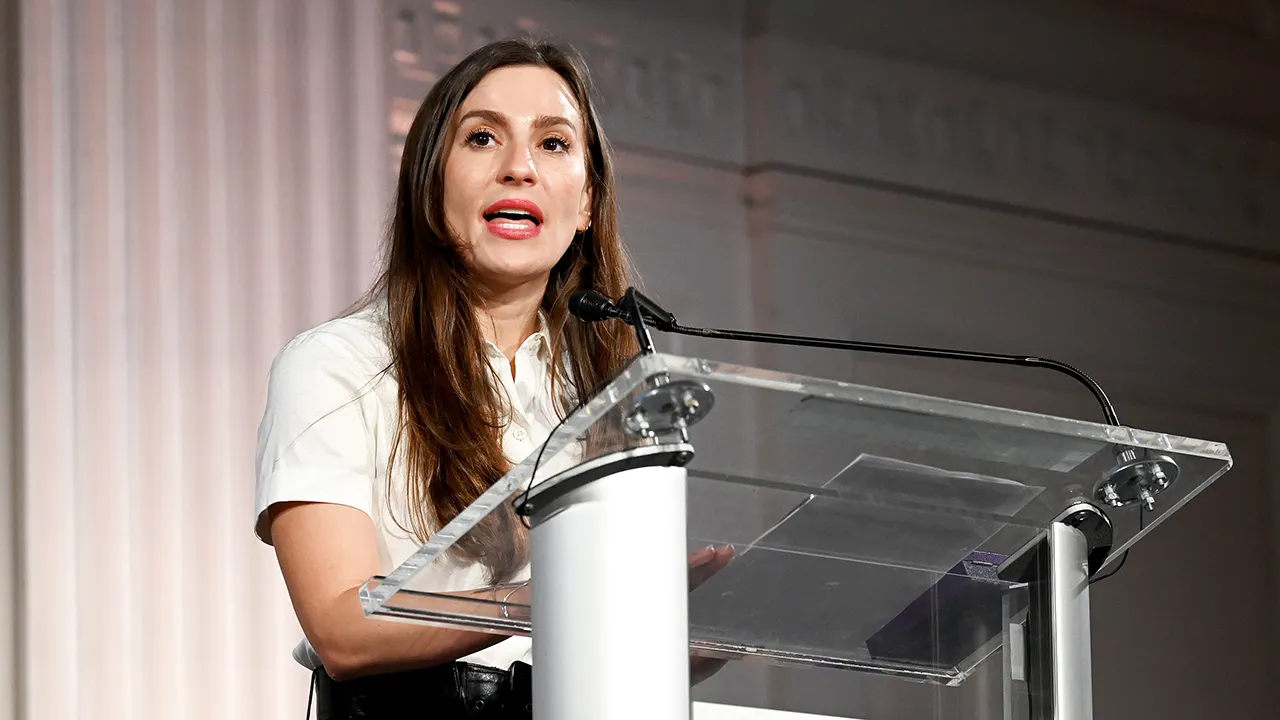Vice President Harris makes remarks on July 17 at a screening of a documentary about Hamas’ sexual violence during the Oct. 7 attack on Israel.
Anna Moneymaker/Getty Images
hide caption
toggle caption
Anna Moneymaker/Getty Images
Israeli Prime Minister Benjamin Netanyahu is meeting on Thursday with President Biden and later — separately — with Vice President Harris as the nine-month-long war in Gaza continues to remain a political liability for Democrats heading into a presidential election.

Netanyahu’s visit comes at a critical moment in American politics: with four months to the election, the White House is eager to secure a cease-fire deal to end Israel’s war with Hamas, which began last October with the militant group’s attack on Israel that killed 1,200 people.
Israel’s response has killed 39,000 Palestinians, a significant proportion of them civilians, according to the Ministry of Health in Gaza. A potential deal to end the conflict will undoubtedly be a focus of Biden and Harris’ meetings with Israel’s leader.

Harris, who is now the likely Democratic presidential nominee, inherits this war as she attempts to maintain a delicate balancing act in a race where one misplaced word on the conflict can cost her support in key states that Democrats need to keep the White House.
She is maintaining the administration’s support of Israel and trying to not alienate supporters of the Jewish state, who make up a key Democratic constituency. But she is also expressing sympathy for Palestinian civilians killed in the conflict and trying to win back some of the young, progressive, Black and Brown voters whom Biden alienated with his response to the war.

Israeli Prime Minister Benjamin Netanyahu shakes hands with staunchly pro-Israel Sen. John Fetterman, D-Pa., after delivering an address to a joint session of Congress on Wednesday.
Allison Bailey/Middle East Images/AFP/via Getty Images
hide caption
toggle caption
Allison Bailey/Middle East Images/AFP/via Getty Images
Harris and the humanitarian cost of the conflict
As Biden’s vice president, Harris has remained in lockstep with the president on policy, including his steadfast commitment to the security of Israel.
“Vice President Harris has gone even a step further in taking a leadership role in condemning the horrific sexual violence that was perpetrated by Hamas,” said Halie Soifer, who served as national security adviser to Harris in the Senate and now runs the Jewish Democratic Council of America.
“I attended an event at the White House just last month where she was the leading voice from the White House in drawing attention to Hamas’s use of rape as a weapon of war on that horrific day,” Soifer said.
Though the substance of what Harris has said is similar to Biden, when she speaks about the conflict, the vice president differs in tone, particularly in describing what she has called the “humanitarian catastrophe” in Gaza.
“What we are seeing every day in Gaza is devastating,” Harris said during a speech in Selma, Ala., last March. “We have seen reports of families eating leaves or animal feed, women giving birth to malnourished babies with little or no medical care, and children dying from malnutrition and dehydration.”

Activists participate in a pro-Palestinian protest near the U.S. Capitol on Wednesday. There were multiple demonstrations near the Capitol to protest Israeli Prime Minister Benjamin Netanyahu’s visit to Washington.
Alex Wong/Getty Images
hide caption
toggle caption
Alex Wong/Getty Images
In both public and private, Harris is seen to show a greater understanding and empathy for Palestinians, multiple people told NPR. And they say she’s also shown greater empathy for protesters demonstrating against Israel’s military operation.
She told The Nation in an interview that young people protesting the war are “showing exactly what the human emotion should be, as a response to Gaza.” Her comments have caught the attention of voters and foreign policy experts.
“If you look at her public remarks about Gaza as vice president, unlike Biden, she really did manage to convey a much greater empathy and sympathy for the suffering of Palestinians,” said Aaron David Miller, a longtime Middle East expert with the Carnegie Endowment for International Peace.
A political opportunity for Harris
For some Democrats who voted ‘uncommitted’ during the presidential primaries as a way to protest Biden’s policy, Harris’ expressions of empathy has left them open to giving her a chance.
“If I had, for example, tried to go to a mosque or Arab community event and urged them to vote for Joe Biden, I would never be invited back. The anger was so deep. And the hurt was so deep — even for me,” said Georgia State Rep. Ruwa Romman, a Palestinian-American.
But Romman says she thinks people would be open to hearing from Harris and letting her make her case.
While some Democrats would like to see Harris chart a new policy path, experts say it’s highly unlikely that if she became president, Harris would break from decades of bipartisan consensus on Israel.
Still, experts say she may be more open to strike a tone distinct from Biden’s. “She’s a strongly, I would argue, pro-Israeli, moderate, mainstream Democrat,” said Miller.
“But at the same time, she really doesn’t have Biden’s long history with Israel nor any of its leaders. And she’s also from a different generation, which means she’s going to put a greater focus, I think, on human rights, diversity, discrimination.”

Abdullah Hammoud, the mayor of Dearborn, Mich., home to the largest Arab-American community in the U.S., voted uncommitted during the primaries.
He has said he felt betrayed by the administration, but now says he feels like there’s an opportunity for Harris to “course correct.” He points out that a majority of Democrats disapproveof the Israeli military’s actions in Gaza.
“Now, whether hope flourishes or dies, I really believe it’s going to be dependent upon these next crucial weeks and the messages that come forward from Vice President Kamala Harris’s campaign,” Hammoud said. “I think she has a real opportunity.”

Prime Minister Benjamin Netanyahu and House Speaker Mike Johnson walk inside the Capitol before Netanyahu’s address to a joint session of Congress on Wednesday.
Allison Bailey/Middle East Images/AFP/via Getty Images
hide caption
toggle caption
Allison Bailey/Middle East Images/AFP/via Getty Images
Critics of Biden’s Gaza policy aren’t the only ones watching Harris’ messages in the weeks ahead. Democrats are deeply divided on Israel, and Republicans are united in criticizing her. Netanyahu is scheduled to meet with former President Donald Trump, the Republican nominee, on Friday, and Harris’ views will almost certainly come up.
The vice president typically presides over joint addresses in Congress, but on Wednesday, she was not present for Netanyahu’s remarks. Her team cited a scheduling conflict.
But House speaker Mike Johnson told Jewish Insider it was a “terrible symbolic gesture” and suggested she would “pay a price for it politically.”




















Discussion about this post